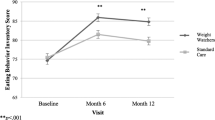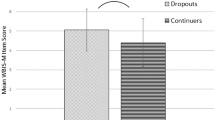Abstract
Objective:
To investigate weight loss expectations and goals among obese treatment seekers and to examine the relationships of these expectations and goals to treatment outcomes.
Method:
Participants were 180 obese men and women (age 43.8±10.1 years; body mass index 37.6±4.2 kg/m2) who received one of four-year-long treatments that combined behavioral and pharmacological methods. Before treatment, they reported the amount of weight they realistically expected to lose after 4, 12, 26 and 52 weeks of treatment, as well as their ultimate weight loss goals. Expectations and goals were compared across treatment groups and examined in relation to previous weight loss efforts, weight loss and regain in treatment, attrition, satisfaction with treatment and mood.
Results:
Participants in all treatment groups expected reductions at week 52 that were significantly greater than the 5–15% of initial weight they were told was realistic and significantly more than they had ever lost before. Weight loss expectations were unrelated to achieved weight loss in all groups but one, in which greater expectations were associated with greater losses. Failure to meet weight loss expectations for the first 26 weeks of treatment was related to lower satisfaction ratings, but was not related to weight regain or attrition over the next 26 weeks. Symptoms of depression were reduced from baseline, regardless of whether participants achieved or failed to achieve their expected weight losses.
Conclusion:
Across groups, we observed no negative consequences of having (and failing to meet) unrealistic expectations for weight loss.
This is a preview of subscription content, access via your institution
Access options
Subscribe to this journal
Receive 12 print issues and online access
$259.00 per year
only $21.58 per issue
Buy this article
- Purchase on Springer Link
- Instant access to full article PDF
Prices may be subject to local taxes which are calculated during checkout


Similar content being viewed by others
References
Foster GD, Wadden TA, Vogt RA, Brewer G . What is a reasonable weight loss? Patients' expectations and evaluations of obesity treatment outcomes. J Consult Clin Psychol 1997; 65: 79–85.
Foster GD, Wadden TA, Phelan S, Sarwer DB, Sanderson RS . Obese patients' perceptions of treatment outcomes and the factors that influence them. Arch Intern Med 2001; 161: 2133–2139.
Dalle Grave R, Calugi S, Magri F, Cuzzolaro M, Dall'Agio E, Lucchin L et al. Weight loss expectations in obese patients seeking treatment at medical centers. Obes Res 2004; 12: 2005–2012.
Linde JA, Jeffery RW, Finch EA, Ng DM, Rothman AJ . Are unrealistic weight loss goals associated with outcomes for overweight women? Obes Res 2004; 12: 569–576.
Wadden TA, Womble LG, Sarwer DB, Berkowitz RI, Clark VL, Foster GD . Great expectations: ‘I'm losing 25% of my weight no matter what you say’. J Consult Clin Psychol 2003; 71: 1084–1089.
Fabricatore AN, Wadden TA . Obesity. Annu Rev Clin Psychol 2006; 2: 357–377.
Cooper Z, Fairburn CG . A new cognitive-behavioral approach to the treatment of obesity. Behav Res Ther 2001; 39: 499–511.
Cooper Z, Fairburn CG, Hawker DM . Cognitive-Behavioral Treatment of Obesity: A Clinician's Guide. Guilford Press: New York, 2003.
Dalle Grave R, Calugi S, Molinari E, Petroni ML, Bondi M, Compare A et al. Weight loss expectations in obese patients and treatment attrition: an observational multicenter study. Obes Res 2005; 13: 1961–1969.
Jeffery RW, Wing RR, Mayer RR . Are smaller weight losses or more achievable weight loss goals better in the long term for obese patients? J Consult Clin Psychol 1998; 66: 641–645.
Ames GE, Perri MG, Fox LD, Fallon EA, De Braganza N, Murawski ME et al. Changing weight-loss expectations: a randomized pilot study. Eat Behav 2005; 6: 259–269.
Finch EA, Linde JA, Jeffery RW, Rothman AJ, King CM, Levy RL . The effects of outcome expectations and satisfaction on weight loss. Health Psychol 2005; 24: 608–616.
Foster GD, Phelan S, Wadden TA, Gill D, Ermold J, Didie E . Promoting more modest weight losses: a pilot study. Obes Res 2004; 12: 1271–1277.
Wadden TA, Berkowitz RI, Womble LG, Sarwer DB, Phelan S, Cato RK et al. Randomized trial of lifestyle modification and pharmacotherapy for obesity. N Engl J Med 2005; 353: 2111–2120.
Brownell KD . The LEARN Program for Weight Control 7th edn American Health Publishing: Dallas, 1998.
Brownell KD, Rodin J . The Weight Maintenance Survival Guide. Brownell & Hager: Dallas, 1990.
Brownell KD, Wadden TA . The LEARN Program for Weight Control: Special Medication Edition. American Health Publishing: Dallas, 1999.
Beck AT, Steer RA, Brown BK . Beck Depression Inventory Manual, 2nd edn Psychological Corporation: San Antonio, 1996.
James WPT, Astrup A, Finer N, Hilsted J, Kopelman P, Rossner S et al. Effect of sibutramine on weight maintenance after weight loss: a randomised trial. Lancet 2000; 356: 2119–2125.
Wadden TA, Butryn ML . Behavioral treatment of obesity. Endocrinol Metab Clin North Am 2003; 32: 981–1003.
Celio AA, Zambinski MF, Wilfley DE . African American body images. In: Cash TF, Pruzinski T (eds.) Body Image: A Handbook of Theory, Research, and Clinical Practice. Guilford Press: New York, 2002. pp 234–242.
National Institutes of Health/National Heart Lung and Blood Institute. Clinical guidelines on the identification, evaluation, and treatment of overweight and obesity in adults: the evidence report. Obes Res 1998; 6: 51S–210S.
Wadden TA, Brownell KD, Foster GD . Obesity: responding to the global epidemic. J Consult Clin Psychol 2002; 70: 510–525.
Acknowledgements
This study was supported in part by the following grants from the National Institutes of Health: K23-DK070777 to Dr Fabricatore; K24-DK065018 and R01-DK56124 to Dr Wadden and K23-DK60023 to Dr Sarwer. We thank Jennifer L Krasucki, Christopher I Wilson and Daniéle M Bourget for assistance in the preparation of this manuscript.
Author information
Authors and Affiliations
Corresponding author
Rights and permissions
About this article
Cite this article
Fabricatore, A., Wadden, T., Womble, L. et al. The role of patients' expectations and goals in the behavioral and pharmacological treatment of obesity. Int J Obes 31, 1739–1745 (2007). https://doi.org/10.1038/sj.ijo.0803649
Received:
Revised:
Accepted:
Published:
Issue Date:
DOI: https://doi.org/10.1038/sj.ijo.0803649
Keywords
This article is cited by
-
A qualitative study to examine meaningful change in physical function associated with weight-loss
Quality of Life Research (2023)
-
Depression and obesity among females, are sex specificities considered?
Archives of Women's Mental Health (2021)
-
Psychiatric Disorders Among Obese Patients Seeking Bariatric Surgery: Results of Structured Clinical Interviews
Obesity Surgery (2015)
-
Should providers encourage realistic weight expectations and satisfaction with lost weight in commercial weight loss programs? a preliminary study
SpringerPlus (2014)
-
Associations between physical activity and quality of life outcomes in adults with severe obesity: a cross-sectional study prior to the beginning of a lifestyle intervention
Health and Quality of Life Outcomes (2013)



